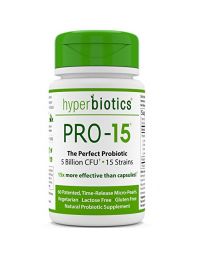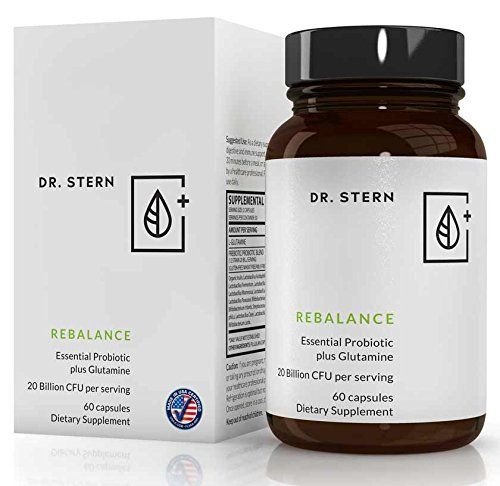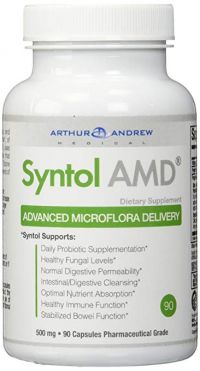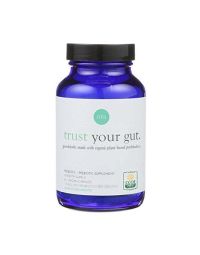Probiotic supplements have increased in popularity recently as the relationship between the gut microbiota and other aspects of health has become more well-known. Though the names sound similar, prebiotics are not the same as probiotics, though the two are related. As a food source for beneficial bacteria, prebiotics can also support a healthy intestinal ecosystem, and it could do you a lot of good to take both prebiotics and probiotics together.

Your body is host to many organisms. An estimated 100 trillion bacterial and yeast cells live within your lower intestines, collectively known as your “gut microbiome” or microflora. These microorganisms help you digest certain large molecules your body otherwise isn’t able to, and secrete smaller, easily-absorbed nutrients. A healthy population of beneficial microbes, also known as probiotics, can even help prevent harmful strains of bacteria or yeast from taking hold and causing an infection.1
Probiotic supplements contain a number of these beneficial microbes in an inactive state. Once you swallow them, your stomach acid and digestive enzymes break down any capsule they were in and the heat and moisture of your body reactivate them. These probiotics then begin growing and proliferating in your intestines, increasing the biodiversity of your gut microbiota and contributing to its healthy effects. For the greatest benefits, look for probiotic supplements that contain higher numbers of different strains of microbes, and are guaranteed to contain a minimum of one billion viable CFUs (colony forming units).1,2

Prebiotics
You have heard how eating plenty of fiber is good for your digestion; this follows the same principle as why prebiotics are healthy for your gut. The probiotics in your intestines thrive off of specific nutrients, and need specific food sources to grow and flourish. Consuming foods that provide nutrition for these beneficial bacteria promotes a healthier balance of bacterial species in your gut.2
Prebiotics are supplements that provide specific types of fibers that are consumed by your gut microbiota. These are typically indigestible, highly fermentable carbohydrates such as oligofructose, galactooligosaccharides, inulin, acacia gum, or lactulose that are derived from fibrous plant sources.2 Taking prebiotic supplements can increase the numbers of beneficial Lactobacillus and Bifidobacteria strains in your gut.2,3 Garlic, leeks, bananas, beans, chicory root, asparagus, and yacón syrup are excellent dietary sources of natural prebiotics.4 Try getting a dose of 10-20 grams of prebiotic fibers per day for optimal results.5

Synbiotics
Synbiotic is simply the term for a supplement that combines probiotics and prebiotics together. Some foods that contain both probiotics as well as nutritional fibers also work as synbiotics. These include fermented, pickled vegetables like sauerkraut and fermented dairy products like kefir or yogurt.6 Taking synbiotics can enhance the effect of either prebiotics or probiotics on their own, and can convey several health benefits like improved liver function and an immune system boost.6
Be aware when purchasing prebiotic/probiotic mixes: the recommended dose of prebiotics, a minimum of 10 grams per day for noticeable results, is greater than the amount that can fit in one pill or capsule. Normally, you will need to take multiple capsules of prebiotics or synbiotics to gain the health benefits of prebiotic supplementation. Many probiotic supplements do contain prebiotic fibers, but in lower doses than would convey optimal health effects.7 Therefore, it may be beneficial to take both probiotics and prebiotics, but in different supplements to ensure you are receiving the right amount of both.
Synbiotic is simply the term for a supplement that combines probiotics and prebiotics together. Some foods that contain both probiotics as well as nutritional fibers also work as synbiotics. These include fermented, pickled vegetables like sauerkraut and fermented dairy products like kefir or yogurt.6 Taking synbiotics can enhance the effect of either prebiotics or probiotics on their own, and can convey several health benefits like improved liver function and an immune system boost.6
Be aware when purchasing prebiotic/probiotic mixes: the recommended dose of prebiotics, a minimum of 10 grams per day for noticeable results, is greater than the amount that can fit in one pill or capsule. Normally, you will need to take multiple capsules of prebiotics or synbiotics to gain the health benefits of prebiotic supplementation. Many probiotic supplements do contain prebiotic fibers, but in lower doses than would convey optimal health effects.7 Therefore, it may be beneficial to take both probiotics and prebiotics, but in different supplements to ensure you are receiving the right amount of both.
[1] Dimidi E, Christodoulides S, Scott SM, Whelan K. 2017. “Mechanisms of Action of Probiotics and the Gastrointestinal Microbiota on Gut Motility and Constipation.” Adv Nutr. 8(3):484-494. https://www.ncbi.nlm.nih.gov/pubmed/28507013
[2] Simpsom HL, Campbell BJ. 2015. “Review article: Dietary fibre-microbiota interatcions.” Alimentary Pharmacology & Therapeutics. Jul; 42(2):158-179. https://www.ncbi.nlm.nih.gov/pmc/articles/PMC4949558/
[3] John GK, Wang L, Nanavati J, Twose C, Singh R, Mullin G. 2018. “Dietary Alteration of the Gut Microbiome and Its Impact on Weight and Fat Mass: A Systematic Review and Meta-Analysis.” Genes. Mar; 9(3):167. https://www.ncbi.nlm.nih.gov/pmc/articles/PMC5867888/
[4] Genta S, Cabrera W, Habib N, Pons J, Carillo IM, Grau A, Sánchez S. 2009. “Yacon syrup: beneficial effects on obesity and insulin resistance in humans.” Clin Nutr. Apr; 28(2):182-187. https://linkinghub.elsevier.com/retrieve/pii/S0261-5614(09)00030-2
[5] Delzenne NM, Neyrinck AM, Cani PD. 2011. “Modulation of the gut microbiota by nutrients with prebiotic properties; consequences for host health in the context of obesity and metabolic syndrome.” Microbial Cell Factories. Aug 30; 10(Suppl 1):S10. https://www.ncbi.nlm.nih.gov/pubmed/?term=Modulation+of+the+gut+microbiota+by+nutrients+with+prebiotic+properties%3A+consequences+for+host+health+in+the+context+of+obesity+and+metabolic+syndrome.
[6] Markowiak P, Śliżewska K. 2017. “Effects of Probiotics, Prebiotics, and Synbiotics on Human Health.” Nutrients. Sep 15; 9(9):E1021. https://www.ncbi.nlm.nih.gov/pubmed/28914794
[7] July 26, 2014. “Product Review: Probiotics for Adults, Children and Pets.” ConsumerLab. https://pdfs.semanticscholar.org/9021/77766c56d4dff3bec14b0477ce74bcc867ff.pdf
-
Probiotics for Infants
By Dr. AnnaMarch 8, 2022 -
Probiotics for Men
By Dr. KarenMarch 8, 2022 -
Vegan Probiotics
By Dr. KarenMarch 8, 2022 -
Probiotics for Yeast Infections
By Dr. KarenOctober 19, 2021 -
Probiotics for Weight Loss
By Dr. KarenMarch 8, 2022 -
Probiotics for Constipation
By Dr. KarenMarch 8, 2022 -
Best Time to Take Probiotics
By Dr. KarenMarch 8, 2022 -
Probiotics for Children
By Dr. KarenMarch 8, 2022

Search the blog
Article Categories
- All Articles (95)
- Rating Charts (1)
- Beauty & Skincare (17)
- FAQ (0)
- Hair Care (9)
- Health & Wellness (12)
- Anti-Aging (4)
- Kid's Health (0)
- Makeup (2)
- Men's Health (2)
- Oral Care (3)
- Sunscreen (7)
- Skin Tools & Treatments (10)
- Supplements (26)
- Videos (0)




















